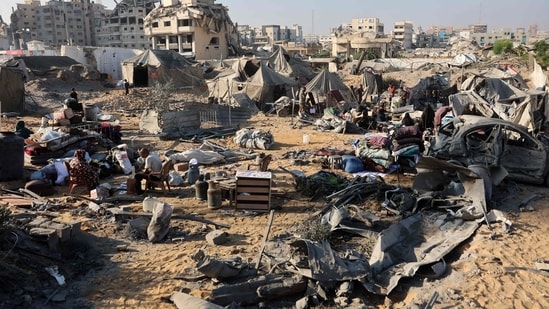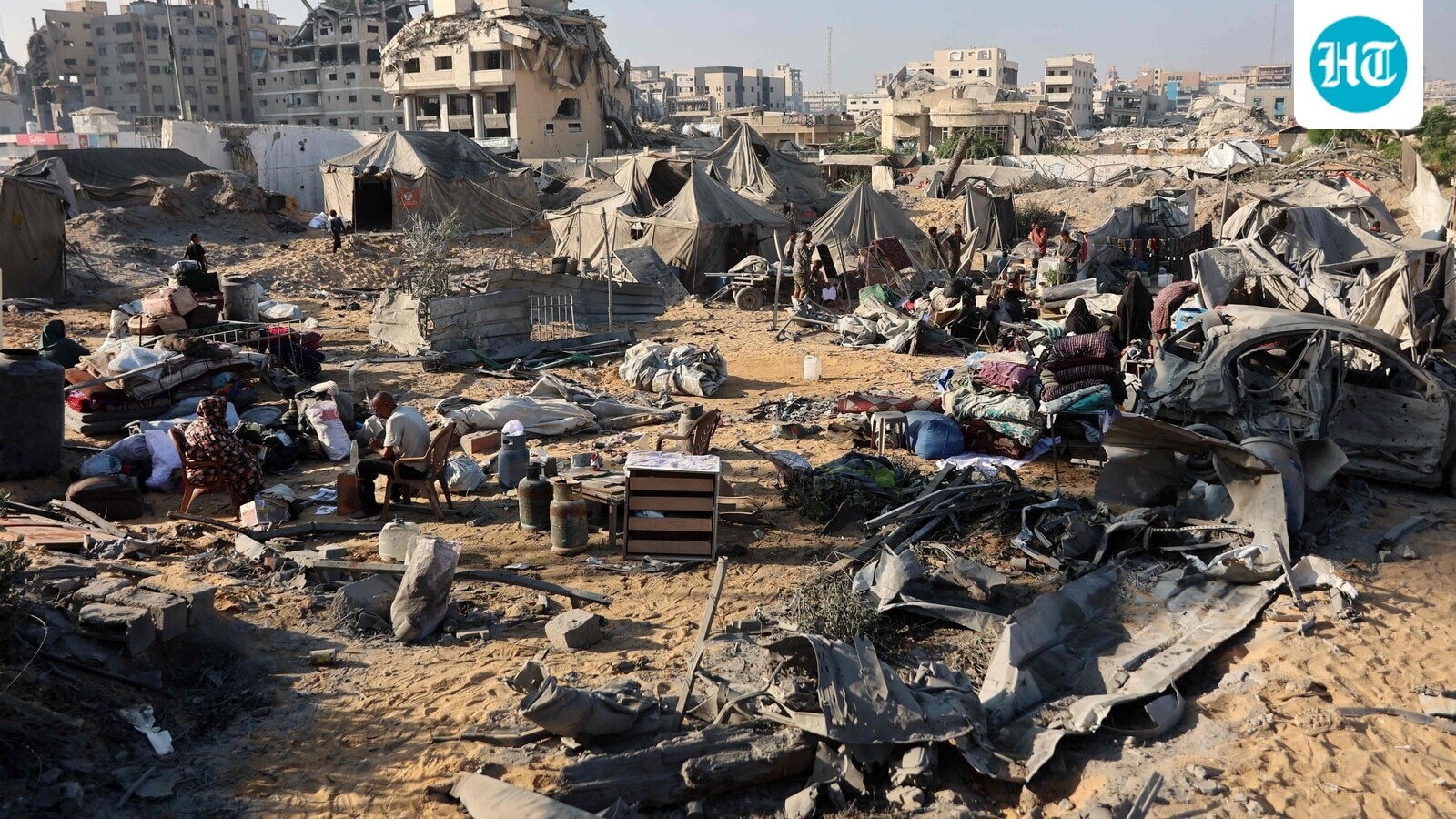Israel’s indiscriminate attacks on Gaza have struck a devastating blow to humanitarian principles and severely obstructed the delivery of essential aid. In nearly two years of war, Israeli forces have killed more than 65,000 Palestinians, while destroying health centres, schools, roads, and other critical infrastructure. Alongside the militarisation of Gaza, Israel has weaponised starvation by enforcing a relentless blockade, cutting off food and medicine vital to the population’s basic survival.
 Displaced Palestinians check what remains of their tents, following an overnight Israeli strike that levelled a building and damaged the surrounding temporary shelters, in the Rimal neighbourhood of Gaza City.(Omar al-Qattaa/AFP)
Displaced Palestinians check what remains of their tents, following an overnight Israeli strike that levelled a building and damaged the surrounding temporary shelters, in the Rimal neighbourhood of Gaza City.(Omar al-Qattaa/AFP)
The humanitarian fallout has been catastrophic. The most pressing issue is Israel’s denial of access to humanitarian assistance. By controlling entry points, the Israeli campaign has produced mass starvation, malnutrition among children and adults, and widespread civilian deaths unrelated to Hamas. Over 6,000 aid trucks have been blocked from entering Gaza, while several international aid organisations have been prevented from delivering food, clean water, electricity, and medical supplies. On August 22, 2025, the UN-backed Integrated Food Security Phase Classification declared famine in Gaza, affecting 514,000 people, with projections of 641,000 by the end of September.
Continuous bombardment has compounded the crisis by dismantling Gaza’s service infrastructure. Roads, hospitals, and distribution networks have been deliberately destroyed, along with humanitarian warehouses. The bombing of the World Food Programme facility in Deir Al-Balah and repeated attacks on UNRWA sites have crippled aid storage and redistribution from Egypt. WHO warehouses, staff housing, and health centres have also been targeted, directly undermining emergency medical care. Health workers, already operating without protection in evacuation zones, face harassment, arrest, and detention by Israeli forces. The destruction of Gaza’s health system has left more than two million people without reliable access to care.
These actions constitute grave violations of international humanitarian law. Hundreds of aid workers have been killed, signalling not just attacks on individuals but an assault on the very foundations of international law designed to protect civilians in war. UN experts have classified such actions as crimes against humanity, citing murder, torture, sexual violence, and forced displacement. The repeated targeting of displaced civilians and hospitals, such as Kamal Adwan Hospital, illustrates Israel’s failure to uphold its legal obligations, amounting to war crimes.
Israel has justified its campaign as retaliation for the Hamas-led attack of October 7, 2023. Yet its sweeping military operations blur the line between combatants and civilians. The systematic denial of humanitarian aid reflects an intention not simply to defeat Hamas but to wipe out the Palestinian population. Statements by Israeli officials reinforce this interpretation. For example, Israel Katz, former minister of energy and infrastructure, declared, “All civilian population in Gaza is ordered to leave immediately. We will win. They will not receive a drop of water or a single battery until they leave the world.” Such rhetoric demonstrates the deliberate use of starvation and deprivation as tools of war, in defiance of international appeals.
The International Court of Justice (ICJ) recognised the severity of these actions in its January 26, 2024 ruling, identifying a “plausible genocide.” The ICJ ordered Israel to “take immediate and effective measures to enable the provision of urgently needed basic services and humanitarian aid within one month.” Human Rights Watch later reported that Israel failed to meet even this minimal requirement, deepening the catastrophic humanitarian situation.
Israel has not only ignored these international directives but has also obstructed external scrutiny. Independent interventions remain heavily restricted, and media access is curtailed. On April 1, 2024, Al Jazeera was banned in Israel and the occupied territories. According to the Committee to Protect Journalists, Israel has killed 184 Palestinian journalists and media workers since October 2023, with broader reports indicating the death toll among media professionals may be as high as 270, including foreign correspondents. This silencing of the press has severely limited global awareness of Gaza’s suffering, insulating Israel’s campaign from accountability.
The crisis in Gaza is not merely a by-product of war but the outcome of deliberate strategies: starvation as a weapon, destruction of humanitarian infrastructure, and suppression of aid and information. These actions violate the Geneva Conventions, undermine international humanitarian law, and erode the moral fabric of the international order. The ICJ’s warning of “plausible genocide” underscores the gravity of the situation.
Israel’s campaign against humanitarian access reveals a calculated effort to dismantle Gaza’s capacity for survival, blurring the distinction between military objectives and civilian annihilation. The deaths of tens of thousands, the famine declared by international bodies, and the targeting of aid workers and journalists point to a broader attempt to erase the Palestinian presence in Gaza.
The international community cannot afford silence. Without sustained pressure to enforce humanitarian law and protect aid channels, Gaza risks becoming a precedent for the normalisation of collective punishment in modern warfare. Upholding humanitarianism is not only about Gaza, it is about safeguarding the principles of civilian protection and human dignity everywhere. On September 16, the UN Independent International Commission of Inquiry on the Occupied Palestinian Territory, including East Jerusalem, declared that Israel has committed genocide against Palestinians. It has been investigated for the last two years since October 7, 2023.
On September 21, Britain, Canada, Australia, and Portugal officially recognised a Palestinian state. It is the recent attempt to isolate and pressure Israel. Britain, Canada, and Australia are close allies of Israel, and they have been facing immense pressure from pro-Palestinian protests at home. Now, almost 160 of the 193 UN member states have recognised a Palestinian State. The French President also pledged to recognise a Palestinian State. More countries are expected to do the same before the UN General Assembly’s session. This is a positive development towards a two-State solution. However, a lasting peace requires all these countries to implement international laws and bring perpetrators of genocide to justice. It involves enforcing, particularly, the 1948 Convention on the Prevention and Punishment of the Crime of Genocide and the 24 January rulings of the International Court of Justice. Navi Pillay, Chair of the UN Commission, stated, “Every day of inaction costs lives and erodes the credibility of the international community. All states are under a legal obligation to use all means that are reasonably available to them to stop the genocide in Gaza.”
This article is authored by Mehdi Hussain, teaching fellow, Ashoka University.

